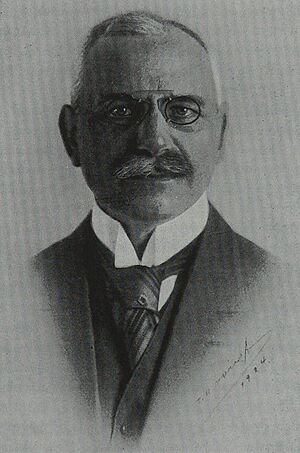Georg Voigt (politician) facts for kids
Quick facts for kids
Georg Voigt
|
|
|---|---|
 |
|
| Mayor of Barmen | |
| In office 1906–1912 |
|
| Preceded by | Johannes Gustav Brodzina |
| Succeeded by | Paul Hartmann |
| Mayor of Frankfurt | |
| In office 1912–1924 |
|
| Preceded by | Franz Adickes |
| Succeeded by | Ludwig Landmann |
| Mayor of Marburg | |
| In office 12 February 1925 – 13 April 1927 |
|
| Preceded by | Paul Troje |
| Succeeded by | Johannes Müller |
| Personal details | |
| Born | 16 September 1866 Klein-Schellmühl near Danzig, Prussia (Młyniska, Gdańsk) |
| Died | 13 April 1927 (aged 60) Marburg, Weimar Germany |
| Nationality | German |
| Political party | NLP / DDP |
| Alma mater | University of Breslau, Humboldt University of Berlin, University of Königsberg |
Georg Philipp Wilhelm Voigt (born September 16, 1866 – died April 13, 1927) was an important German politician. He served as the mayor of several cities, including Rixdorf, Barmen, Frankfurt, and Marburg. Being a mayor means he was the top leader of a city, like a principal is the top leader of a school.
Contents
A Life in Public Service
Early Life and Education
Georg Voigt was born in a place called Klein-Schellmühl, which was near Danzig in Prussia. His father was a hotel manager, which means he ran a hotel.
From 1886 to 1890, Georg Voigt went to university. He studied law at three different universities: Breslau, Berlin, and Königsberg. Studying law helped him understand rules and government, which was useful for his future career.
Becoming a City Leader
In 1899, Georg Voigt became the mayor of Rixdorf. Today, Rixdorf is part of Berlin. This was his first big role leading a city.
After that, he became the mayor of Barmen. He served there from 1906 to 1912. His job was to help the city run smoothly and make decisions for its people.
Leading the City of Frankfurt
In 1912, Voigt became the mayor of Frankfurt. This was a very important city. While he was mayor, he also became a member of the Prussian House of Lords in 1907. This was a special group that helped make laws for Prussia. He was part of the National Liberal Party, which later changed its name to the German Democratic Party.
During his time as mayor of Frankfurt, a difficult event happened. French troops occupied Frankfurt for a short time in 1920. This meant foreign soldiers were in charge of the city. When a small incident occurred, Mayor Voigt acted quickly. He asked everyone in the city to stay calm and follow the instructions of the soldiers. This helped prevent bigger problems.
Final Years in Marburg
Georg Voigt continued to serve as mayor of Frankfurt until 1924. After that, he was chosen to be the mayor of Marburg. He started this new role in February 1925. He continued to lead Marburg until he passed away in April 1927. He was buried in Berlin-Zehlendorf.

